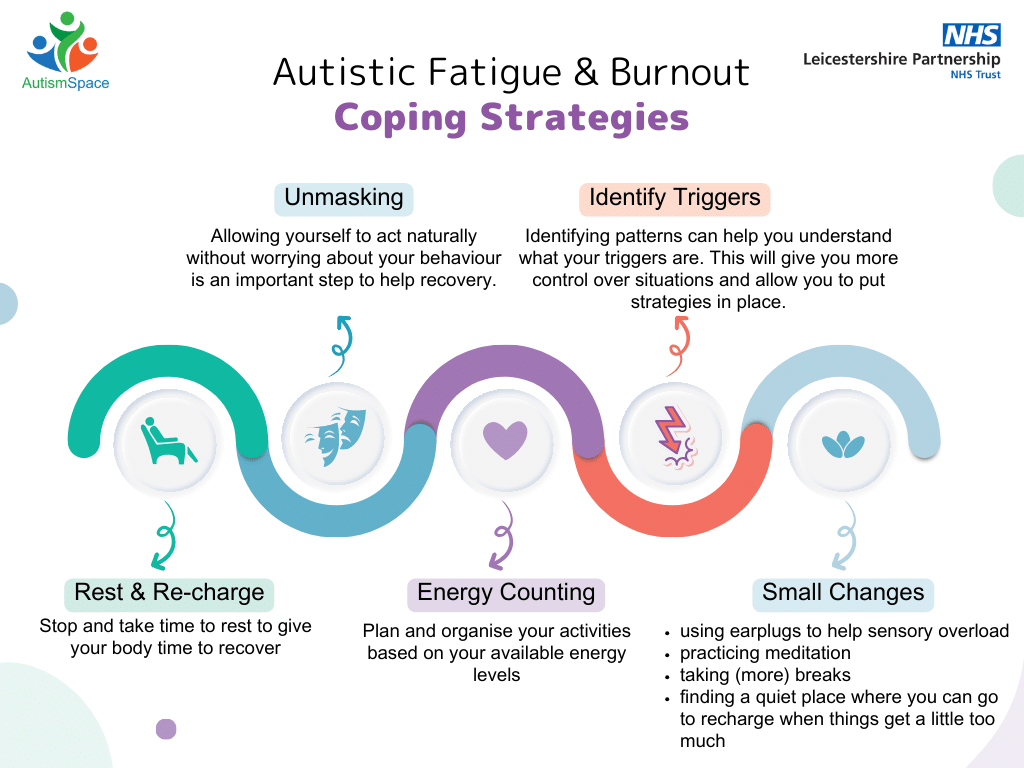Click here to view or download this graphic as an accessible pdf
Here are a few things you can do to try and help yourself.
Rest and recharge
When you are experiencing fatigue and/or burnout, it’s important to stop and take time to rest to give your body time to recover.
Depending on how your feeling, this may mean reducing other activities you have scheduled, such as clubs and sports activities.
Instead, opt for activities that re-energise and relax (for example a meditation session). If you are struggling, it may be a good idea to talk to someone like a school nurse or teacher, GP, employer or a trusted adult in your life to help put some reasonable adjustments in place to help you.
Unmasking
Masking whether consciously or unconsciously requires a significant amount of energy and can be extremely draining.
Examples of masking include forced eye contact, copying behaviour/ facial gestures and suppressing stimming.
Allowing yourself to act naturally without worrying about your behaviour is another important step to take to help recovery.
Energy counting
Managing energy levels is essential. To do this, try using an energy accounting system to set manageable limits on your energy levels to help stop yourself from going into a state of fatigue or burnout.
To do this you can set a limit which represent how much energy you have daily or weekly and then estimate how much is used by different activities and how much energy you get back from activities that energise you.
Once you have calculated this, you can plan and organise your activities based on your energy levels, which will help you to cope better and manage stress levels.
Small changes
Putting simple changes/adaptations in place can help you to cope and manage better and reduce the risk of fatigue and burnout.
Examples of this include:
- using earplugs to help with sensory overload
- practicing meditation
- taking (more) breaks
- finding yourself a quiet place where you can go to recharge when things get a little too much.
If you struggle to remember to take breaks, try setting reminders to take breaks throughout your day.
It’s easy to fall into cycles of behaviour, so to help stop this and reduce the risk of fatigue and burnout, take the time to stop and listen to your body and what it needs.
Identifying cycles and patterns of behaviour, for example how you feel after being in a crowded place, can help you to start understanding what your triggers are.
This will give you a better idea of what to expect, which can then give you more control over situations.
You can then work towards making necessary changes and putting strategies in place to help you to cope better when you start to experience the signs of fatigue and burnout.
If you are struggling with autistic fatigue and burnout, speak to your GP to get some help and advice.
If you are having thoughts about harming yourself or suicide, it is important to speak to someone, contact one of the services below and get some help:
Samaritans
Whatever you’re going through you can call us any time, from any phone for free on:
116 123
SHOUT
The UK’s first 24/7 crisis text service, provides free, confidential, 24/7 text message support in the UK for anyone who is struggling to cope. This service is free on all major mobile networks, for anyone in crisis, anytime.
Text SHOUT to 85258.
Central Access Point
If you are in need of urgent NHS mental health support, you should call the Mental Health Central Access Point which is open 24/7.
Call: 0808 800 3302





